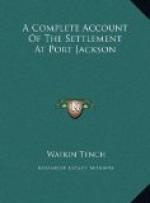With all these people I conversed and inspected their labours. Some I found tranquil and determined to persevere, provided encouragement should be given. Others were in a state of despondency, and predicted that they should starve unless the period of eighteen months during which they are to be clothed and fed, should be extended to three years. Their cultivation is yet in its infancy, and therefore opinions should not be hastily formed of what it may arrive at, with moderate skill and industry. They have at present little in the ground besides maize, and that looks not very promising. Some small patches of wheat which I saw are miserable indeed. The greatest part of the land I think but indifferent, being light and stoney. Of the thirteen farms ten are unprovided with water; and at some of them they are obliged to fetch this necessary article from the distance of a mile and a half. All the settlers complain sadly of being frequently robbed by the runaway convicts, who plunder them incessantly.
December 6th. Visited the settlements to the northward of the rivulet. The nearest of them lies about a mile due north of Mr. Clarke’s house. Here are only the undernamed five settlers.
-------------------------------------------------------
----------------------- Men’s names. | Trades. | Number of | Number of acres | | acres in each | in cultivation. | | allotment. | ------------------------------------------------------------
------------------ Thomas Brown*, wife, and child —– 60 ) William Bradbury* —– 30 ) 3 1/2 William Mold* —– 30 ) Simon Burne, and wife Hosier 50 3 ——Parr, and wife Merchant’s clerk 50 3 1/2 ------------------------------------------------------------
------------------
[These three cultivate in partnership.(Brown, Bradbury, Mold.)]
These settlers are placed on the same footing in every respect which concerns their tenure and the assistance to be granted to them as those at Prospect Hill. Near them is water. Parr and Burne are men of great industry. They have both good houses which they hired people to build for them. Parr told me that he had expended thirteen guineas on his land, which nevertheless he does not seem pleased with. Of the three poor fellows who work in partnership, one (Bradbury) is run away. This man had been allowed to settle, on a belief, from his own assurance, that his term of transportation was expired; but it was afterwards discovered that he had been cast for life. Hereupon he grew desperate, and declared he would rather perish at once than remain as a convict. He disappeared a week ago and has never since been heard of. Were I compelled to settle in New South Wales, I should fix my residence here, both from the appearance of the soil, and its proximity to Rose Hill. A corporal and two privates are encamped here to guard this settlement, as at Prospect.




